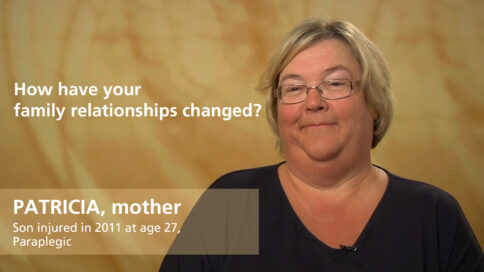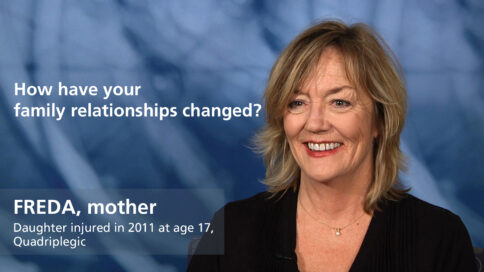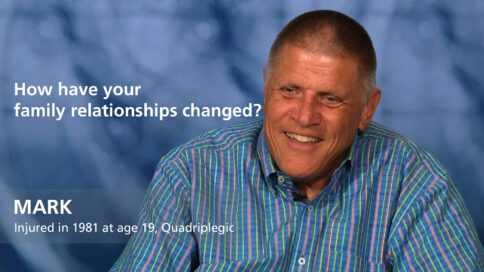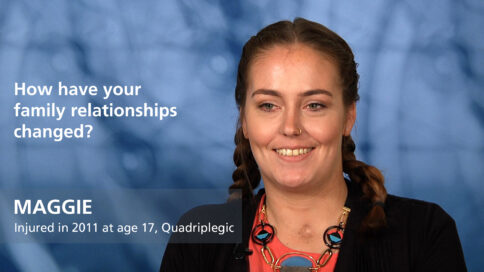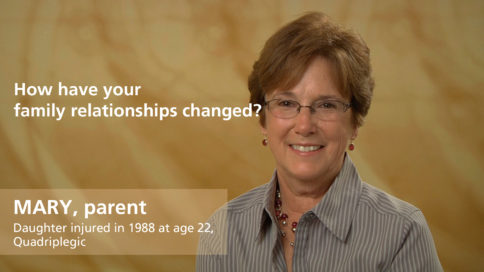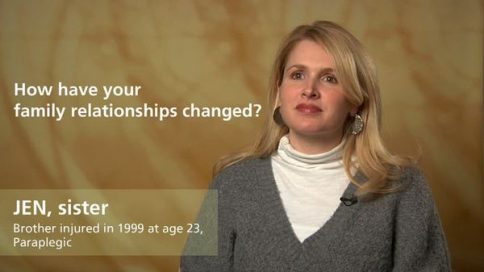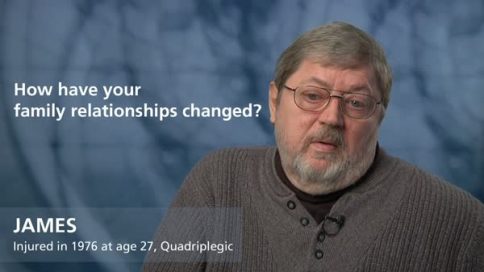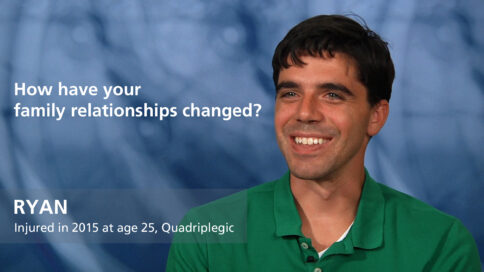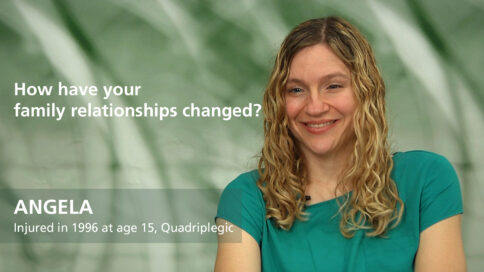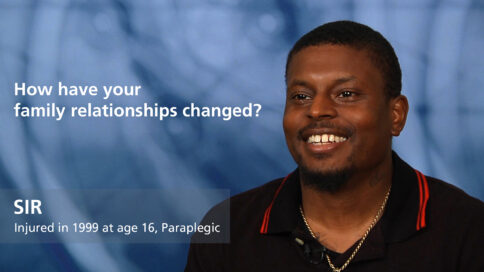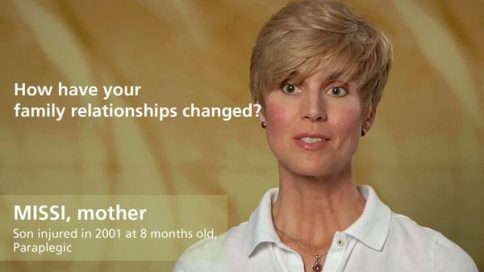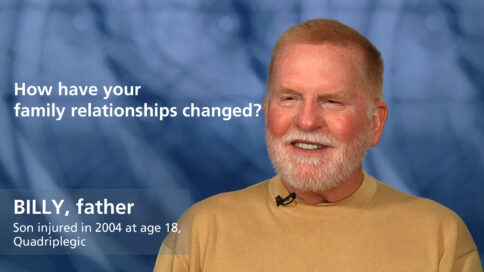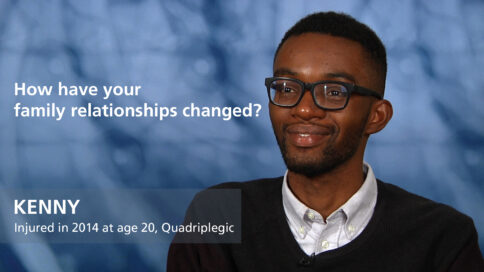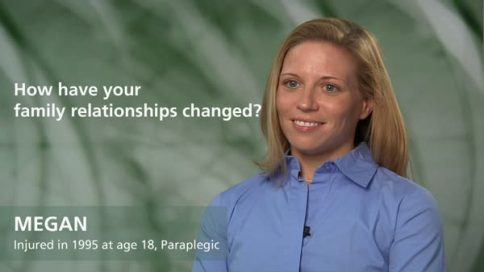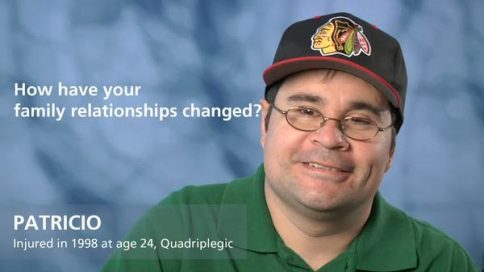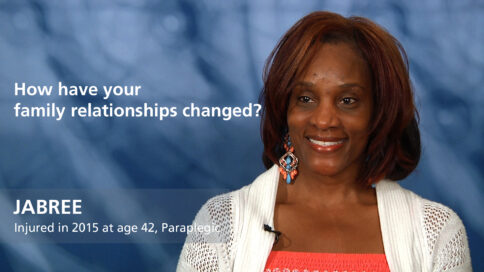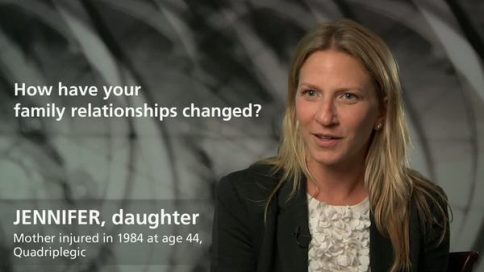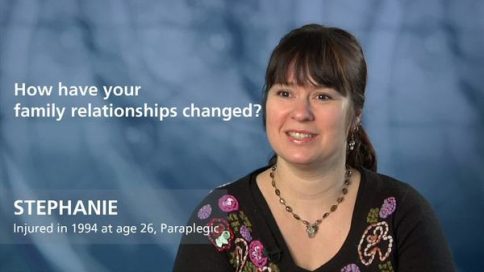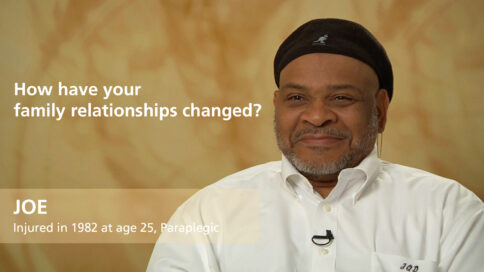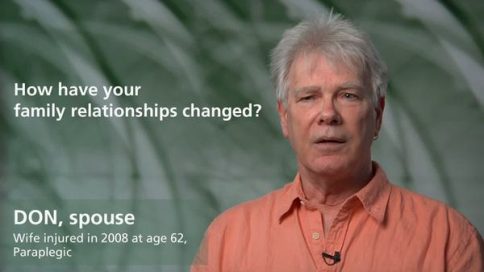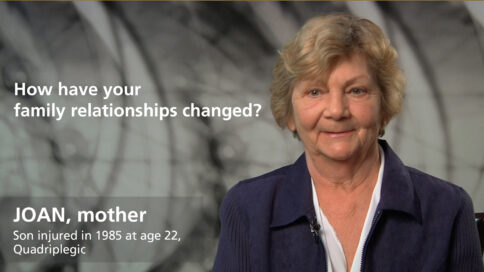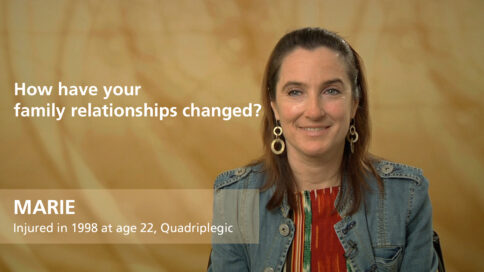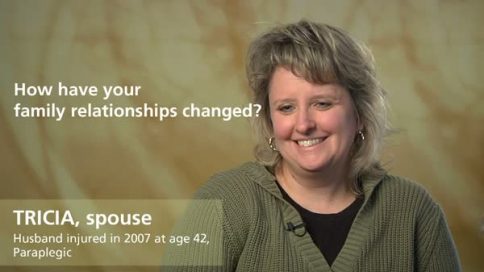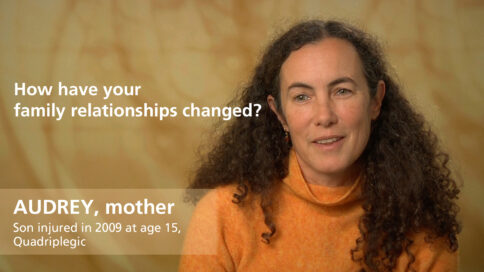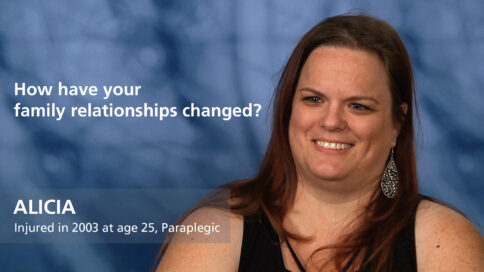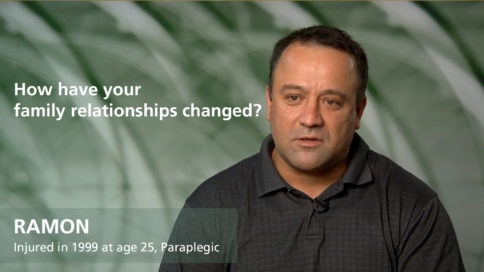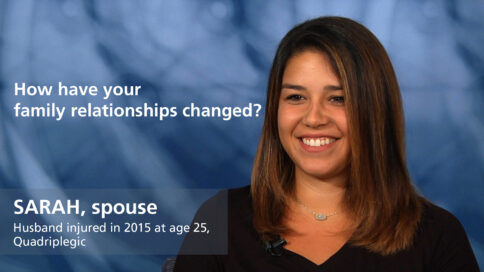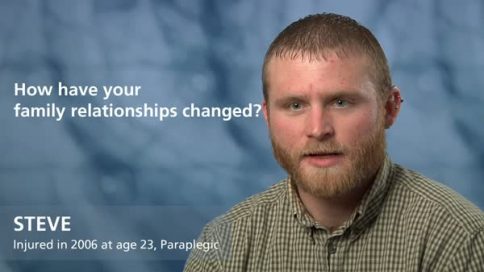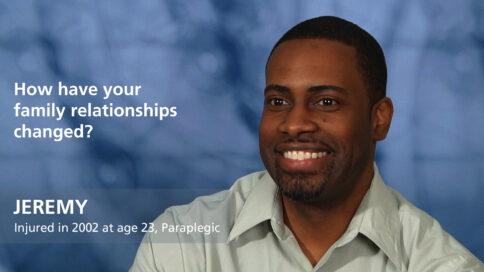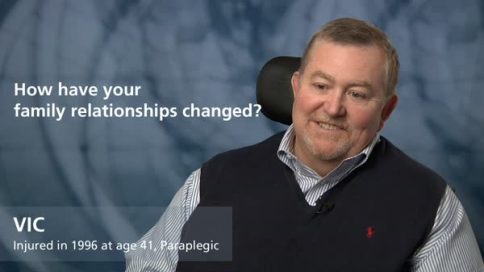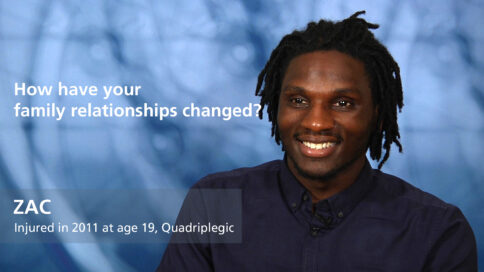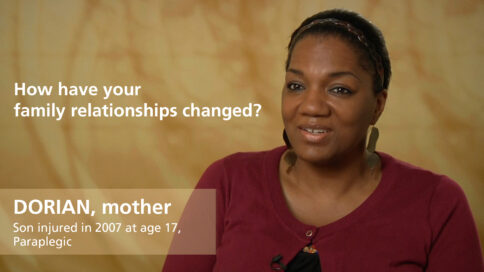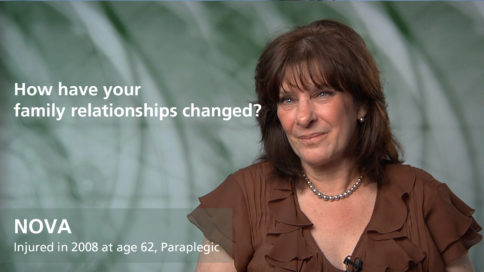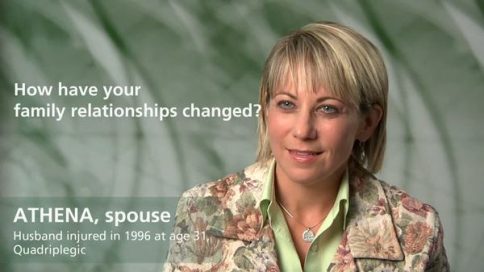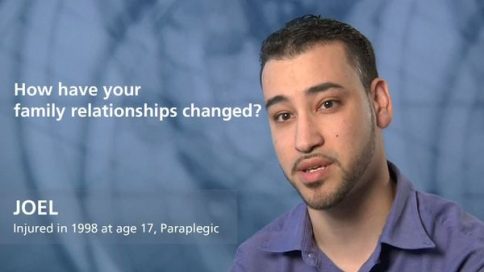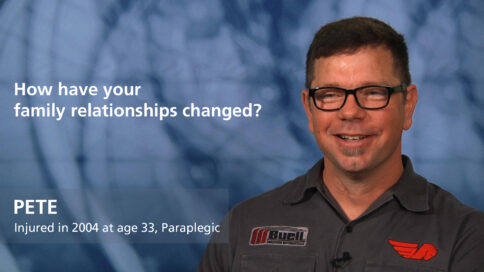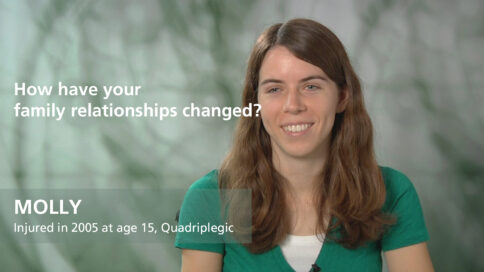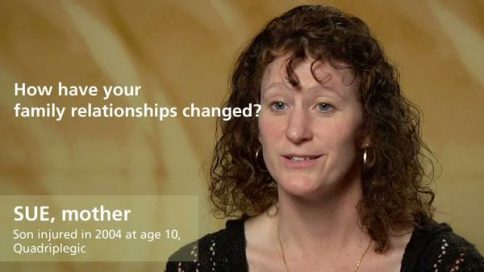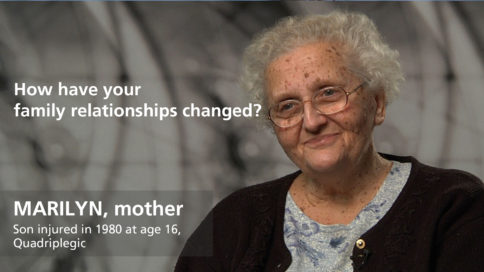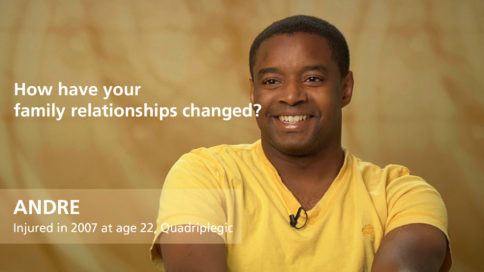|
Topics Choose a topic to watch videos that answer real-life questions |
Q&A: How have your family relationships changed?Family Adjustments After a Spinal Cord Injury |
Filter byGENDERLEVEL OF INJURYAGE AT INJURYFAMILY MEMBERS |

I have a daughter, my son’s sister, and she’s 18-and- half month younger than my son. They were always very close, and this accident has kind of pulled them a part a little bit. He doesn’t call her like he should. She says she can’t get in touch with him, gets angry at him for not going out and looking for a job. She gets angry at him for taking money from us. But, it’s something that siblings go though, and I think the sibling piece needs to be recognized by families. It is just as hard for the siblings as it is for the parents to see this happen. This has brought all of us, my three kids extremely close, they’re all best friends. My youngest, he was 15, 14 at the time. It did take him a year or two before, I think he was afraid. Maggie was fragile, you know, even though that was his sister, it was difficult. Now, I wouldn’t change, there’s been so many positive things that have come out of this. The relationships we have, I don’t think, in between she and I, it’s the most intimate relationship you can ever have with a person. Yeah, my mom was, like so many moms, she was there to do whatever she needed to do because my dad was on the road a lot. My parents were just there, they were basically told back then “take him home, take care of him until you can’t, and then put him somewhere.” Now, that was well-intended professionals giving that kind of advice to my parents, but you know “if you can take care of him, take him home, and when you can’t, put him somewhere.” So, it wasn’t like “oh, he’s going to have relationships, and get married, and have a family if he wants, and a job and all that.” The expectation bar was so low back then that I was alive, and they ought to be happy about that and just take him home. I am so much more close with my family at this point that I wouldn’t trade anything for it. You know, my older brother he disapproved of what I was doing. And we’re only one grade apart, so we didn’t talk before my accident, he wouldn’t talk to me. He is my best friend in the world today. I have never been this close with my family, and it’s so important because when it comes down to it, your family is who is going to be there through and through. Initially, the family relationships, especially among Marie and her siblings, were turned all upside down. The youngest in our family is a girl, and she and Marie were inseparable. When Marie was injured, I remember Colleen sitting by her bedside and just couldn’t take her eyes off of her, couldn’t leave the room. No matter what, she would stay next to her. The one son was very rebellious and kind of was resentful that he wasn’t the one who was injured. “Why did it have to happen to Marie? She was good, she was great, and she was this and that.” And, he judged himself not to have those qualities and really felt bad that his sister was the one who was injured. So, he had struggled for years with that. And, our other son decided that it wasn’t time to act up or do anything. So, he kind of got into a line and just was the good kid. So, everybody was playing a different role than they had played prior to her injury. Over time, things have kind of gone back to normal; especially where Marie was the head of the bunch. She’s still the go-to person in the family for all the kids, and she’s the one who is the first to jump in if there is a problem or a situation that needs to be managed. Marie’s right there. My mother has aged away quicker than she should have in the past ten years. And I feel like she, I feel like she worries about him again like she used to when we were little. And, you know, she said to me, one time, "When your children get a little bit older,"—you know at the time of his accident we were 27, 25 and 23— and I think she had just had that sense of, "Oh gosh, they're going to be okay, they're not little kids anymore," and then that happened. So, I think that forced her back into a, "Oh, well forever I'll be worried about them, and hope that they're okay." And, I'm sorry this is a separate thing, I think that my dad and my brother are way closer than they ever were before his accident. They never had a whole lot in common, and they have very different interests, and this accident, and the resulting spinal-cord injury, they've never been closer. The relationship I think with my parents changed in that in their eyes, I suddenly became a dependent son again. Even though I was married, I had my own family, my own house; I had left their “nest,” if you will, many years ago. They seemed to think, and to some degree they were right, that I needed them more. And they became more involved in our family’s life—maybe more than we wanted them to be. We welcomed their help, believe me, we did, as we did my in-laws help. But it put a little bit of a strain on things from time to time. Initially I was—I got a lot closer with my sister and my brother-in-law because we lived with them. Initially, I didn’t see my brother as much because we would do a lot of active able-bodied things together. And I think it took some time for him and I to kind of figure out what was going on, and kind of figure out our relationship and get comfortable again. But really, my relationship with my family is same as it was before, it’s great, yeah. I had always been this independent, fiery teenager, and all the sudden I was dependent on everyone for help. So, that was certainly a shift. My two younger sisters really had to stand up and help. In families, I think role shifts are the biggest change that occurs after spinal cord injury. My family relationships changed because I was angry, like severely angry, so I would flip from angry to depressed a lot. So, the only person that I just was around was my mom because that’s who was taking care of me, but she couldn’t even be around me, that’s just how angry I was. She would cook that morning, and she would just get away, and get out the house and just let me be. Because I was at a stage where I was looking at a trophy that I won in karate and football, and I’m breaking them, I’m just upset that a lot of things that I used to do I couldn’t do at that time, so it was, yeah. So, but then my other family, like I would be around my sister and my nephew, but I wasn’t around my whole entire family because I pretty much stayed to myself. I think actually it's been an invaluable learning lesson for our other children. I think they've learned a whole level of compassion that they would have never known if this hadn't been a part of our family. Just their concern for other people, just I don't know that, I think that our kids at a young age have just realized people are who they are on the inside; it's not what it is on the outside. I just think we're not as self-focused as kids can be. I think you can really get immersed with yourself and; "What do I want to do," and "where do I want to go" and "what do I want to be involved with." And, they haven't been able to think that way, because they've had to think of others. They've had to think of their brother, they've just taken notice of what other's needs are. So, they haven't got as self absorbed as maybe society could lend them to. We’ve always been a very close family. It’s just, he’s our only child. I was older, and my wife was too when he was born. So, we were always very close, and we stayed close. It put a strain a little bit with me being over here for three months and her being back in Memphis, and then her coming over and me going back to Memphis. You know, we kind of focused everything around him on trying to make sure he was healthy, he was improving and trying to figure out what we were going to do with this whole thing. You know, I mean if you’ve been through it, remodeling the house and all that. So, we got closer. When I went back to Memphis, I broke at that point. I had to go through counseling. Best thing I ever did in my life was going through there. And then when Talbot came home to stay, he went through counseling with the same woman. And then eventually my wife, I found out she didn’t at first tell me she went to counseling with the same woman too, and then we went as a group through counseling. And it was very beneficial. We were able to lay our thoughts out, what we thought about the whole situation. We got to be very honest with one another. We were still very close but we all had different opinions of how this was affecting each other, you know. So, it was good to find out. It was the greatest thing I’ve ever done. I was probably pretty close to suicidal. Shepherd’s Center realized that and gave me some counseling when I was here. But when I got back I was just so depressed I didn’t want to do anything. And I realized I needed some professional help. I’d never done it before but boy, it was terrific. You know, she read me like a book, you know. It was good. I think because of my injury, we’re a lot closer as a family. We’ve had to support each other a lot more and it’s not just around me. My family is based in Nigeria, so there are times where either my mom or my dad will be here in Atlanta with me, and my little brother or little sister would be in Nigeria on their own. And they would have to kind of take care of the household and look after each other and they have really matured because of it. It’s really quite astonishing when I look at my little sister and how much, because of my injury, she’s grown as a person. And when we are all together, we cherish the time that we have together a lot more. A constant throughout everything is my mom. I think if anything, the accident completely deepened our relationship. We were always close, you know, I would say that we were friends before my accident. But the things that we've been through now, I mean to have that level, every time I've been in the hospital, and I've had seven surgeries since my accident, so there have been a lot of complications, every time she's been there. She's given up a lot for me and I, you know, in return feel that I have a commitment to her as well that is deeper, I think, than any other kind of bond that you have—more than a friend, more than a lover, more than any other family member. You know that bond, that I know she's always there for me, and that I'm there for her. We're, I would say, with my family, I mean with my mom, the love has always been there. You know, that's one of the things for me is, just waking up and seeing her, you know, that's the beauty of it. With my brothers, we've always been close, but never really talkative, you know, not really share all that, just close, and the one of the major things was my dad. Back then he used to drink, so we never really had a relationship, period. Now he doesn't drink and helps out a lot more around the house, now he helps out with me a lot more. So, you know, it's still not a perfect relationship, father-son, but it is a lot better than what it was. They’ve gotten stronger, but me and my mother were best friends prior to this happening, and we’re still that now. It’s just we are day-to-day, and now I feel like I need to really take care of her, and she still feels like she needs to take care of me. So, our relationships have just gotten stronger, as well as that with my sons. They feel like, “okay, I now need to take care of mom.” I think it kind of drove a wedge in between all of us and our dad a little bit, because of, because of the stress of the situation— and then them ultimately there getting divorced. And while none of us blame him for that, I think that it changed all of our relationships. I think it was, you know, it was hard for him, you know, to be the man who was married to a woman who became a quadriplegic and then was divorced, and there was all this, you know, there was a whole thing that went along with that, a lot of it not being true. I think that changed all of our relationships in odd ways. He and I were always very, very close; but I think me being forced to grow up more quickly put a stress on our relationship, more than I had ever known. Because there was an expectation now of the responsibilities I had in the household that I didn't have before. When she first came home, we would fight about the fact that, you know, there were certain things he felt my brother couldn't do because it just would be appropriate for him to do in taking care of her. And so those things fell to me. Well, my mother specifically, I think she's a little more sensitive. You know, I think this was harder on her in many ways than it was on me. You know, it's always different when you're the one going through it versus the one who's sort of watching someone go through it. There're not many people that you can open up to in the world—your mother is one of them, so she's privy to a lot of stuff that maybe a lot of people aren't. I think she feels that very deeply. You know, a little anecdote about sort of some of the other relationships in my family. You know, when I was in in-patient, I remember saying to both of my brothers who are younger than me, you know, saying at the time, "You know, really I'm okay to talk about this if you want to talk about it. I realize it's weird, it's different, it's new—you can ask me questions." And one of brothers came back and said, "Well, can I borrow your car?" It was a stick shift, I wasn't going to be able to drive it again, so...But that, you know, summed it up right there. And I was just like, "All right, things will be okay." You know, so what did I say, I said "Of course, borrow the car." Oh my family, we love each other dearly. Again, I was an animal once, and then I stopped being an animal. And then I went to my family and said, “I want to be a human being.” And they chose to let me be a part of our family again, because I had truly, truly wrecked our relationship. I was a thief, I was a liar, I was a drug addict, but now, there’s nothing they wouldn’t do for me, and there’s nothing I wouldn’t do for them. I think for the better, I feel that we've probably come a lot closer. Adversity does an awful lot. When I was in service one year, under adverse condition, you got the guys that are your buddies backing you up, I mean you got they're back, they've got your back. In a family, unless you're so screwed up, I'd like to think that we all came together as a real unit. I mean, I remember the days in the hospital, the sitting there in tears wondering what's going on. You know, holding each other, caressing each other, doing what we needed to do to make each other feel better. As time went by, it's a lot stronger, and there's something much deeper than that. I mean, these are our kids, you love your kids. How can you love them more—when bad things happen, it says an awful lot when you get together, and I think you can love each other more. We have a common goal and the common goal is: mom, wife—this is who we're taking care of. Oh course, worrying about him. Where he is— he’s in between my daughter, and my husband and I, so we keep a good eye on him. And, then we make sure somebody’s always around. Like, if we go on vacation or something, that my daughter’s there, or vice-versa, when they go, we make sure we’re there with him. It’s worked out very well, he has a very lovely caretaker, which he’s had for three years, and it’s developed into a marriage. So, that’s just happened recently, and she’s a very lovely lady. Who knows? Maybe I might be a grandma someday! So, I’m looking forward to the future, hopefully and happy. I don’t think they have changed all that dramatically. They did in the beginning, but then it’s kind of like the pendulum swings way to one side, and then way to the other. And when the dust settles, and life starts to settle down, and things become more routine, it falls back into the middle. I’m the oldest, and I was the go-to person. If there was going to be an event, it was going to be at my house. And for the most part, it still is that way. So, I don’t think they’ve changed dramatically in the long term. My daughters were 7 and 11 at the time. It was a hard change, I think, for the kids because I worked part-time, so I got them off in the morning, I was home for them in the afternoon, and over the years that’s obviously changed. I get them off in the morning, but he’s home in the afternoon with them, or they come home alone. It’s a little harder as far as the way the kids deal with things. My older one, before the accident was very clingy. She did everything with me; I couldn’t even go to the grocery store without her. You know, the most boring of details she wanted to be with me. Since the accident though, she’s actually changed quite a bit. She’s come out of her shell, she’s very independent. She started high school this year, and she is very open to trying new things. My little one on the other hand, who was very independent, and always running around doing something with the neighbors, the friends, has kind of reverted the other way now. She’s actually more to herself. She likes to watch TV; she likes to do things that, you know, don’t necessarily involve tons of people. She actually has a lot of anxiety, she doesn’t like going to school. I don’t know—we’re working on that to figure out what’s going on with her. But, whether that stems from the accident, that she doesn’t want dad to be home alone, maybe she feels comfortable being with him, I can’t say for sure right now. A lot of it to me is just change. I think when the accident happened for her, school was her comfort zone. I think she enjoyed being there because it was a steady in her life, and now she moved up to, like, a level where they’re changing classes, and they’re changing for gym, and they have, you know, four schools combined into one. And so, there’s tons of people there, and it’s just a different environment for her. And I think that that change, she’s really struggling with it right now. We are seeing a professional for assistance with what my youngest one is dealing with in school, and the anxiety she’s having with the changes that are going on in her life now. It’s been interesting. I think the dynamic that’s particularly changed has been between the three boys. So, between my eldest and my second, between the child whose disabled and the second, there’s two years, and between the second and the third, there’s fifteen months. So, they’re very close. They’ve always, fortunately, been very good friends, but there’s always the eldest, the middle and the youngest. Well with the eldest being disabled, the middle child has kind of stepped up into the older-brother role in a very good way. We really made a big effort to try and not always have everything be all about Nico. I think that’s a big danger. I don’t know how successful we were, but we tried. I think it’s a very difficult thing to achieve, to not have whole world revolve around the other child. And, that’s as important in my mind not just for the other two children, but also for the handicapped person themselves. Because, the world doesn’t revolve around them, as much as might feel like it sometimes. But, the long and short of it is that out there, the world does not revolve around him, and so we all need to figure out how to deal with that. Well at first, when I was first injured—I’m really close to my step dad because my step dad is here, and my real dad was in Colorado. And, we had that family meeting, well, his sister was in a car accident several years before me, but she’s a quad. And I don’t know if they were just taking that, that I was going to be the same as her, or just like “let’s not even deal with it.” But he was like, “oh, you might need to go to a nursing home.” I’m like, “ahh,” you know, that was the last thing on my mind. I was like, “no, I don’t need to go to a nursing home.” It was kind of hard at first because they blamed my husband. It was a big blame-game at first. The relationship with my family, and my caregiver—my big sister—they haven’t changed. We’re just the two brats that we grew up together. She cares more, she still wants to be there, she calls me at five o’clock every day, and asks me “What do I need?”—if I need her to stop by and bring me some, you know, carry-out, some carry-in, some food, or if I need anything. And my question and my answer every day is, “No, I don’t need anything Yvonne, thank you. Go away, get a life!” That’s what I tell her, and then she keeps calling me every day. With my mom, because my mom, my relationship with my mom is that she still wants to see me cured, and it doesn’t bother me, but it’s just “Come on Ma.” I mean, everybody around it—“I’m working, I’m doing stuff, let’s just get over the fact that it’s all wrong with me.” And then, you know, she’s a Latino mother, “Oh, my son, I saw you walk, I carried you in my arms, you have to be okay again, or normal.” And I’m, “Mom, I do all kinds of stuff. Don’t you see?” So, I’m still dealing with my mom a little bit. I have two, I have another sibling, another brother from my mother’s second marriage, and those guys are the coolest. They don’t care; they treat me like they treat me when we were growing up together. They know I kid around, I’m grouchy, and, but they’re always, as soon as I call them, or say something, they know how to react because they know, “Okay, now he’s asking for help, this is serious.” So, the dynamic of the family hasn’t changed a lot. They do have to make some modifications when we go to celebrate birthdays, or have birthday parties with the big old family I got here because, “Oh, Ramon’s coming. Can we go there?” Or, some folks, like the Quinceañera is a big party in my culture, so the Quinceañera is their day, and some of my cousins, they’re like, “Oh man, we’re looking for a hall that you can go to.” And I go, “It’s your party! You go ahead and do whatever the hell you want, and I’ll try to be there. You know, don’t make a party around me, It’s your party, you know, your wedding, your Quinceañera.” So, my family, the whole family, is still like, “Oh, what can we do for Ramon?” It’s, “Just carry me in.” I mean, and my cousins are big, so they can carry me. I feel like Ryan and I are a lot closer to his family and my family because they really rallied around us when this happened and came together and kind of created one big unit. So, that was really helpful, and a very big part of what helped us handle what was happening and be able to move forward the way that we did. While we were in the rehabilitation center, we had them visit pretty much every day. My mother is a massage therapist, and she came once a week, and gave him massage to help with like the muscle, and spasms and whatever benefits that he could get from that. And she still does that today. And you know, bring dinners, bring food because the hospital food isn’t bad, but it was nice to have a home cooked meal every now and then. And when we went home I had to go, I was back in the office full time almost, and Ryan wasn’t back to working full time yet. So, his mom would come on the days that I was in the office, and spend time with him, so he wouldn’t be at home by himself. Same thing with his sister, she’s a teacher, so when she had time, she would stay home and make sure that he wasn’t by himself and take him where he needed to go. And, people would help me transport him before he had the ability to drive. His dad, his mom, just everybody pitched in however they could. Boy, ever since paralysis, I have a much better relationship with pretty much everybody because I’ve learned things can be gone in a blink of an eye, and family’s always there. No matter with all this stuff that I went through and they went through, they were right there dealing with it with me. I’ve had friends turn and walk away, but not family. I’ve learned how to love. I’ve learned to be more patient with them, and with everybody else, which, with any relationship, patience really helps. I have an awesome relationship with all them now. If that’s the only thing I’ve gotten out of paralysis, it’s worth it. I could say grown stronger in some aspects. Others, I wouldn’t say purposeful distance, but sometimes depending on where you are and where you’re growing to, certain relationships help nurture that and can cater to where you’re going, or they can hinder it as well. And there are some family members that I have pulled closer to. And then some it seems like there’s more distance, which isn’t a bad thing. We’re just in different places, there were different needs on both ends. But my immediate family is very, very close-knit, and the support that I have from them and then the support that I’m able to give as well is very, very significant. You know that old grandmother saying, “what doesn’t kill you makes you stronger?” You hate to look at it that way, but there were some things that really strengthened my faith in our family structures as well because it helped us all move and pull together. Sometimes when things get testy or frustrating, I think a lot of that is that I might have expectations or something. You know, there’s a certain kind of flavored water that I just like to drink. And I just don’t like regular drinking water, and I’m supposed to drink a lot of water, so I’m drinking this flavored water. And it’s like I kind of think that the flavored water should be there all the time. Well if it’s not, it’s like, “I don’t have any flavored water.” Or if I can’t go out and do things like pick up the drive cleaning, and do all that on Saturday, someone else is going to do that, usually it falls to her—because the kids are all out doing stuff, and all three of them are driving age, and daughter’s away at college—so things fall on her a lot. I think that’s some of the frustrating that happens to me, and then I get frustrated because she’s doing it all, and I don’t want her to do it all, but if she doesn’t, it doesn’t get done—so there’s that back and forth. So, for one let’s talk about my mother, her and I relationship. I mean I’ve always been pretty much of a mama’s boy, but after I got injured, with her being my primary caregiver our relationship has just evolved to something amazing. So, for her and I, we’re almost sort of like best friends to a certain extent. It’s like I still respect her as my mother, but we talk, and we chat and it’s great. And I know that anything that happens, if god forbid I’ve an invol or whatever the case maybe, I can call her up and with no regards, she is going to be right there on my side. So, her and I relationship is super strong. In addition I learned that because I need my family a little bit more with just little things, Just “can you button this for me?” Or “Can you grab this off the cabinet?” I have to value my relationships because I know that I need them, so I’m a little bit more patient and I’m a little bit more respectful. So, I think that my family relationships, or familial relationships, are just like super grown because I know that I need them a lot more now, so I appreciate them a lot more now. The relationships have changed only in the sense that sometimes our family forgets that he can’t walk, because he’s so active, and helpful with other things. He can’t do the mowing of the lawn, but he’ll help them set their TVs up, help them program their cell phones. So, sometimes my dad will say, “Bring me that tool.” And, he’ll say, “Pop-Pop, I can’t bring you the tool, I can’t come upstairs.” And, he’ll say, “Oh yeah, I forgot.” So, the relationships have only changed in that they forget that he can’t walk. The basics haven't changed at all, because we didn't come into this like having to get up to speed on how we loved each other, how we cared for each other. We were a loving family and we were always very close to each other. And we always say we love each other and like each other, so that's kind of cool. We can talk about politics, I love Radiohead, you know we share so many things with each other before this, so the basics stayed the same. What has changed is, now when they want to help me, I better let them. You know, I had to spoil them before and do everything, and I didn't realize, even though I had no intentions of saying this them, that I was saying that they weren't capable of doing it. Now, you know, now I would die rather than make them feel that way about them. I adore them, they're the most wonderful people in the world. So they want to be a part of this and I better let them in—all the way, all the way not just on my terms. Our daughter was so young, she was six months old when he became disabled. She said not too long ago, "it's like the wheelchair is invisible." I mean, she just sees daddy as daddy, and she doesn't see him for his disability. Because he was injured, he wasn't born with his disability, he sees it more than she does, and he feels a lot of the—I don't want to say—lack of respect, but, you know, when a kid doesn't want to be around, you know, her parents or whatever, as teenagers, he takes that like, "oh, it's because I'm disabled." I'm like, "it's not because you're disabled, she doesn't want to be around me. Talk to your friends, and they're having the same issues." You know, these situations always brings us, you know, people closer together. You know, definitely, you know, me and my mom, I've always been a "mama's boy." So, you know, me and her, we continue to be close. You know, my dad is still, he's always been there, and will continue to be there. You know, it changed more so my, my brother for the fact that, you know, at the time my mom and dad weren't living together, so I was the man of the house. With this injury, you know, it forced him to be the man of the house. And, it kind of, like, you know, I'm kind angry at myself, because of that, because I put him in that situation. Because, you know, he was 15 years old, you know, still a kid. He should've just been a kid. But, because of my actions and what happened to me, you know, now it forced him to grow up faster than what he needed to grow. So, it made him become a man, you know, faster than he needed to. My younger son jumped right in. He, I'm not sure how he processed it, but he was a fairly independent kid at the time. So, he sort of went on autopilot through seventh grade. To this day I can't tell you who his seventh grade teacher was, I don't remember. And that's good and I think he knew that we needed him to do that. So he did his own thing, he wasn't real demanding and he was really anxious to help out with whatever she needed, "I'll pick that up for you, I'll get that for you," it was his way of pitching in. Her twin brother was devastated, and their relationship changed significantly for quite a long time. He started making excuses not to visit her in the hospital, and I called him out on that one day. I said, "What is going on here?" And he said, "it is just too difficult for me to watch her try to do the simplest thing," he said, "I can't watch it." And I said, "Okay, I understand that." So he didn't visit her as much, he would wait for when she came home on day visits. And when she came home for good, their relationship was a little strained. He found it very painful, I think for him, to be around her, and so he distanced himself a little bit. And that went on for a while; I would say it took maybe the better part of a year for their relationship to become easy like it was before the accident. And they are very close; they have a great relationship now, but they had to work a little bit on getting it back together. The relationship with my mother grew because I understood where she’s been coming from for all of these years. The relationship with my father grew and got better because I was able to forgive him for his shortcomings in being a young-man father. The relationship with my brother grew because I was able to understand just who he is as his own person. So, I think that on an emotional level, while this is catastrophic and it changes everything, it also gave me a clean slate to start anew from, so that I could in the end, understand, value and appreciate the relationships that I have with the people who are closest to my life. My relationships with my family members immediately after I got hurt definitely changed. It was really hard on my mom especially I think. That was partially because she was a doctor and she understood what was going on. And, I think while I was looking at the immediate future thinking, “How am I going to get back to school?”—“What are we going to do with my friends?” She, I think, was looking a lot further out, and I think that’s part of what made it difficult for her. It was also really hard on my twin brother. We did a lot of things together before I got hurt. We both ran cross-country; we would take the bus to school together, work on our homework together. And, there were a lot of things that we did that we weren’t going to be able to do afterwards. We played a lot of basketball together, and hung out outside, stuff like that. So, I think for him it was hard thinking, “What are we going to do now?” and “How are we going to do that?” My little brother, he kind of took on the silent role where he was always thinking of what I needed before I would ask. So, he would pick up stuff that I dropped before I asked him to, he would bring me tea, he’d move my books around. He was kind of like the little silent guy in the background, but he always knew what I needed, sometime before I even knew I needed it. And, he did a great job of making me not feel like I was a burden to him, and he never acted like it was a huge pain to help me out, he acted like it was not a big deal. And I think now my family is a lot closer. We were close before, but I think something like this—at this point, my family is really close and I know that no matter what happens, they’re going to be there. That’s a great feeling, you can’t ask for any more than that. My daughter, my goodness, she's strong, you know. I appreciate her so much more. And, she never wanted to be a nurse or anything, and still to this day doesn't. But she's a CNA, and she's a CAN because she, just—I never wanted to be a nurse, and I became a nurse—she has a natural ability just like I do to be a nurse. She just naturally takes care of my son; she knows everything about the ventilator. When they asked who all was going to be trained for him as a home caregiver, she didn't once hesitate. She just stepped right in and she's just wonderful. If I say to her, "I need you to be home because I can't to help out with the nursing and take care of your brother," she is there. Unconsciously, it brought us all together, but everybody needs something to bring them together. I felt like this was God waking us all up, and saying, “Ok, it’s time for you really do your job.” Or, I don’t know about doing my job, because I was always a good, I thought I was a good mother, until we had the accident. And, we didn’t know what to do then, we were all out in the cold it seemed like, we didn’t know how to handle it. But, we are all closer together, together now. They definitely got better; it brought my whole family together. I had a step brother who I didn’t see before I was injured for five years, he was living in California, and now I see him almost every single weekend. It definitely brings everyone together, so that was one thing that was positive about my injury. |
